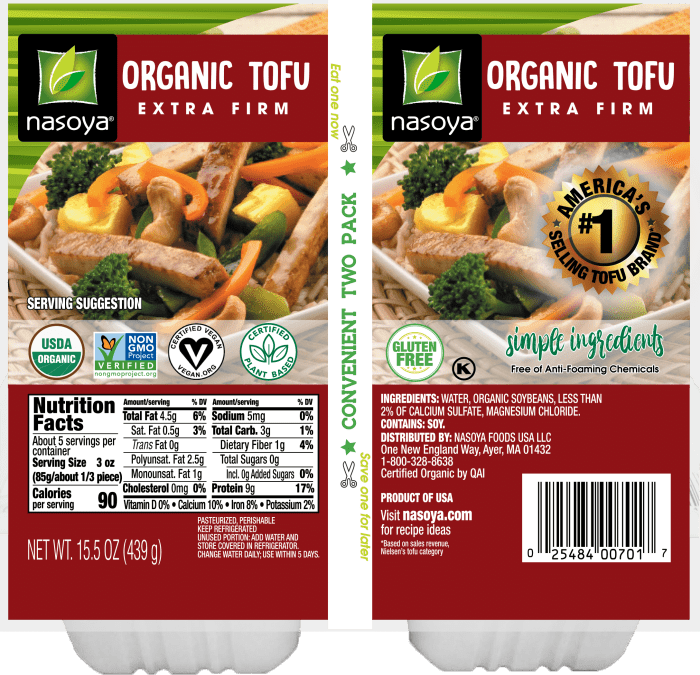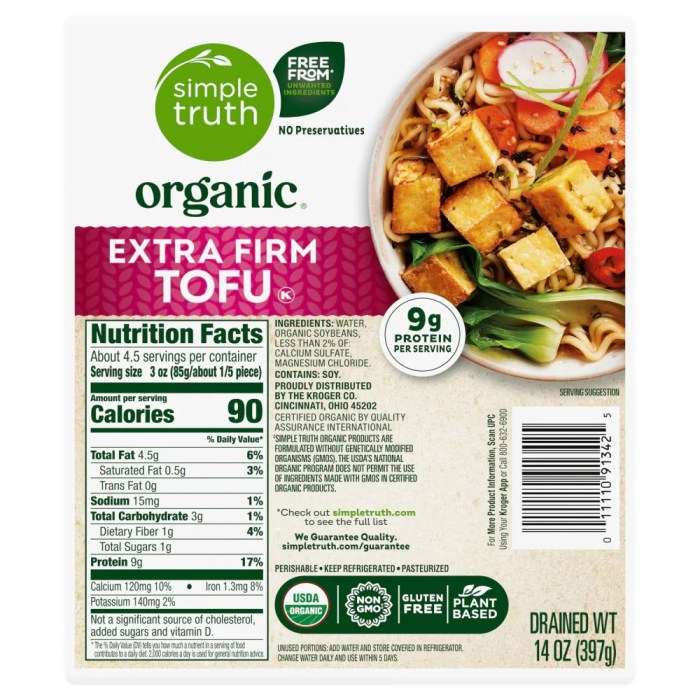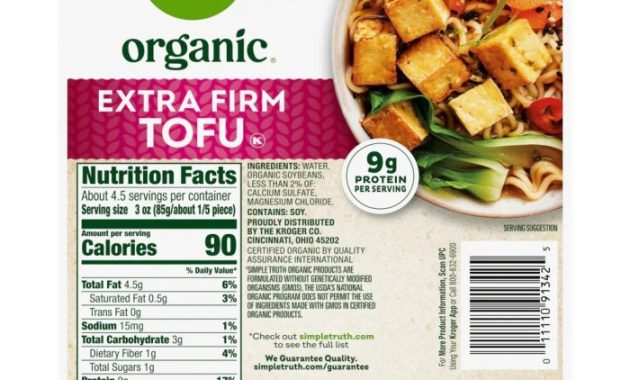Comparison with Other Tofu Types
Extra firm tofu nutrition facts – So, you’ve chosen the champion of firm tofu – extra firm! But how does this protein powerhouse stack up against its softer, silkier siblings? Let’s dive into a delicious comparison of tofu types, exploring their nutritional nuances and culinary versatility. Prepare for a tofu showdown!
The differences between tofu types boil down to one key factor: water content. This seemingly simple detail drastically alters texture, nutritional density, and, consequently, culinary applications. Think of it like this: extra firm tofu is the lean, muscular athlete; silken tofu is the smooth, supple yogi; firm tofu is the dependable all-rounder; and soft tofu, well, it’s the tofu equivalent of a fluffy cloud.
Nutritional Content Comparison
The following table summarizes the nutritional differences, focusing on key nutrients per 100g serving. Remember, these are approximate values and can vary slightly depending on the brand and preparation method. It’s also important to note that the protein content remains relatively consistent across types, although the caloric density can vary due to water content.
| Tofu Type | Protein (g) | Calories | Fat (g) | Calcium (mg) |
|---|---|---|---|---|
| Extra Firm | 8-10 | 70-80 | 4-6 | 150-200 |
| Firm | 7-9 | 75-90 | 5-7 | 120-180 |
| Soft | 6-8 | 80-100 | 6-8 | 100-150 |
| Silken | 5-7 | 90-110 | 7-9 | 80-120 |
Texture and Water Content Differences
The differences in texture are directly related to the pressing process during manufacturing. Extra firm tofu undergoes the most extensive pressing, resulting in a low water content and a dense, meaty texture. Conversely, silken tofu is minimally pressed, resulting in a high water content and a remarkably smooth, almost creamy texture. Firm and soft tofu fall somewhere in between, with soft tofu having more water than firm tofu.
- Extra Firm: Low water content, dense, and holds its shape well during cooking. Ideal for crumbling, pan-frying, or baking.
- Firm: Moderate water content, firm but not as dense as extra-firm. Good for stir-fries, grilling, or making tofu steaks.
- Soft: Higher water content, delicate and easily crumbled. Excellent in smoothies, puddings, or as a base for dips.
- Silken: Highest water content, very soft and creamy. Perfect for sauces, dressings, or desserts. Think tofu cheesecake!
Culinary Applications Based on Nutritional Characteristics
The culinary uses of each tofu type are directly influenced by its texture and water content. Extra firm’s high protein and low water content make it a great meat substitute, while silken tofu’s high water content lends itself to creamy applications. This is not a hard and fast rule; experimentation is key!
- Extra Firm: Its ability to hold its shape makes it perfect for dishes requiring a hearty texture, such as tofu scramble, vegan burgers, or hearty stews. The higher protein content makes it particularly satisfying.
- Firm: Versatile enough for a wide range of dishes, from stir-fries and curries to grilling and pan-frying. It’s a good balance of texture and nutritional density.
- Soft: Its delicate texture is best suited for dishes where it will break down or blend easily, such as smoothies, dips, and creamy sauces. Its higher water content adds moisture.
- Silken: Its incredibly smooth and creamy texture makes it ideal for desserts, sauces, and creamy soups. It’s a great way to add protein and creaminess without a heavy texture.
Health Benefits and Considerations: Extra Firm Tofu Nutrition Facts

Extra firm tofu: it’s not just a blank canvas for your culinary masterpieces; it’s a nutritional powerhouse waiting to be unleashed! Let’s delve into the delightful world of its health benefits and any potential downsides, because even superheroes have kryptonite (though in this case, it might be a medication interaction).Extra firm tofu boasts a protein profile that would make a bodybuilder weep with joy.
Packed with complete protein, meaning it contains all nine essential amino acids our bodies can’t produce on their own, it’s a fantastic option for vegetarians, vegans, and anyone looking to boost their protein intake. Beyond the protein punch, it’s also a surprisingly good source of fiber, which aids digestion and keeps things moving smoothly (no pun intended, but seriously, fiber is great for regularity).
Extra firm tofu boasts a high protein content, making it a staple in many vegetarian and vegan diets. However, its nutritional profile is relatively limited compared to vegetables offering a wider array of vitamins and minerals; for instance, consider the diverse nutrient composition detailed in this resource on yellow squash nutrition facts , which highlights the importance of dietary diversity.
Therefore, incorporating a variety of plant-based foods, like yellow squash, alongside extra firm tofu ensures a more well-rounded nutritional intake.
And then there are the isoflavones – these plant compounds are linked to a whole host of potential health benefits, from bone health to heart health, acting as little nutritional ninjas protecting your body.
Protein Content and its Impact
Extra firm tofu’s high protein content contributes significantly to satiety, meaning you feel fuller for longer. This can be especially helpful for weight management, as it helps curb those pesky cravings between meals. Imagine a world where you’re not constantly thinking about snacks – that’s the tofu-fueled utopia we’re aiming for! The protein also supports muscle growth and repair, making it beneficial for athletes and anyone looking to maintain a healthy body composition.
A serving of extra firm tofu can provide a substantial portion of your daily protein needs, depending on your individual requirements. For example, a 100g serving might offer around 8-10 grams of protein, a solid contribution to a balanced diet.
Isoflavones and Their Potential Benefits
Isoflavones, those aforementioned nutritional ninjas, are a type of phytoestrogen – plant-based compounds that mimic the effects of estrogen in the body. While research is ongoing, studies suggest that isoflavones may play a role in reducing the risk of certain cancers, improving bone density, and alleviating menopausal symptoms. It’s important to remember that these are potential benefits, and more research is needed to confirm these effects definitively.
Think of isoflavones as promising superheroes still undergoing training – they have incredible potential, but their full powers are yet to be fully understood.
Fiber Content and Digestive Health
The fiber content in extra firm tofu contributes to healthy digestion. Fiber adds bulk to your stool, preventing constipation and promoting regular bowel movements. It also feeds the beneficial bacteria in your gut, supporting a healthy microbiome – the ecosystem of microorganisms that live in your intestines and play a crucial role in overall health. A diet rich in fiber is linked to reduced risk of heart disease, type 2 diabetes, and certain cancers.
So, embrace the fiber – your gut will thank you!
Potential Drawbacks and Considerations
While generally safe, there are some potential considerations regarding extra firm tofu consumption. Individuals with soy allergies should obviously avoid it. Also, some medications may interact with the isoflavones in soy products, so it’s always a good idea to consult with your doctor or pharmacist if you have any concerns, especially if you’re on medication for hormone-sensitive conditions.
Finally, some people might experience digestive discomfort like bloating or gas when initially increasing their soy intake. This usually subsides as the body adjusts.
Health Benefits and Risks Summary
Let’s summarize the potential upsides and downsides in a neat little list:
- Benefits:
- High in protein, supporting muscle growth and satiety.
- Rich in isoflavones, potentially beneficial for bone health, heart health, and cancer prevention.
- Good source of fiber, promoting digestive health and regularity.
- Risks:
- Potential allergic reactions in individuals with soy allergies.
- Possible interactions with certain medications.
- May cause digestive discomfort (bloating, gas) in some individuals, especially when initially increasing consumption.
Preparation and Culinary Uses

Extra firm tofu, that culinary chameleon, might seem intimidating at first glance. But fear not, aspiring tofu chefs! With a little know-how, this protein powerhouse can become the star of countless dishes, transforming from a bland blank canvas to a flavor-packed delight. Its firm texture makes it incredibly versatile, holding its shape beautifully during cooking, making it ideal for everything from stir-fries to crumbles.Extra firm tofu’s relatively neutral flavor profile allows it to absorb marinades and sauces like a culinary sponge, taking on the characteristics of whatever deliciousness you throw its way.
Proper preparation, including pressing and marinating, is key to unlocking its full potential and achieving the desired texture and taste. Let’s delve into the exciting world of extra firm tofu culinary adventures!
Methods for Preparing Extra Firm Tofu, Extra firm tofu nutrition facts
Pressing is the first step to tofu enlightenment. This removes excess water, resulting in a firmer, less watery texture that crisps up beautifully when pan-fried or baked. You can achieve this by wrapping the tofu block in a clean kitchen towel, placing a heavy object (like a stack of cookbooks or a cast iron skillet) on top, and letting it sit for at least 30 minutes.
The longer you press it, the firmer it will become. Think of it as a mini-weightlifting session for your tofu – the results are well worth the effort!Marinating is where the flavor magic happens. Extra firm tofu readily absorbs flavors, so don’t be shy with your seasonings. A simple marinade might include soy sauce, ginger, garlic, and a touch of sesame oil.
More adventurous palates can experiment with chili garlic sauce, teriyaki, or even a vibrant citrus marinade. The possibilities are as limitless as your imagination. Marinate for at least 30 minutes, or even overnight for maximum flavor infusion.Cooking methods abound for extra firm tofu. Pan-frying creates a crispy exterior and a tender interior, perfect for stir-fries or as a standalone dish.
Baking yields a similar result, but with a slightly drier texture. Cubing the tofu and roasting it in the oven with your favorite spices is another fantastic option. Finally, crumbling the tofu allows it to be incorporated into veggie burgers, meatloaf substitutes, or even breakfast scrambles, adding a stealthy protein boost.
Diverse Culinary Applications of Extra Firm Tofu
Extra firm tofu’s versatility shines across various cuisines. In Asian cuisine, it’s a staple in stir-fries, noodle dishes, and curries. Imagine it sizzling in a wok with vibrant vegetables and a savory sauce, or cubed and simmered in a fragrant coconut curry. In Western cuisine, it can be pan-fried and served with roasted vegetables, crumbled into tacos or salads, or even used as a vegetarian substitute in shepherd’s pie.
Its adaptability is truly remarkable! It can even hold its own in Mediterranean dishes, cubed and roasted with herbs and lemon.
Simple Extra Firm Tofu Stir-Fry Recipe
This recipe showcases the ease and deliciousness of preparing extra firm tofu.
Ingredients:
- 1 block (14 oz) extra firm tofu, pressed and cubed
- 1 tbsp olive oil
- 1 red bell pepper, sliced
- 1 cup broccoli florets
- 1/2 cup snow peas
- 1/4 cup soy sauce
- 2 tbsp honey
- 1 tbsp rice vinegar
- 1 tsp sesame oil
- 1 clove garlic, minced
- Sesame seeds for garnish (optional)
Instructions:
- Heat olive oil in a wok or large skillet over medium-high heat.
- Add tofu and cook until golden brown and crispy, about 5-7 minutes.
- Add bell pepper and broccoli, and stir-fry for 3-4 minutes.
- Add snow peas and stir-fry for another 2 minutes.
- In a small bowl, whisk together soy sauce, honey, rice vinegar, sesame oil, and garlic.
- Pour sauce over vegetables and tofu, and stir-fry until heated through and sauce has thickened, about 1 minute.
- Garnish with sesame seeds and serve over rice or quinoa.
Nutritional Information (per serving, approximate):
This will vary depending on the specific ingredients used, but a reasonable estimate is:
- Calories: Approximately 300-350
- Protein: 20-25g
- Fat: 15-20g
- Carbohydrates: 20-25g
Note: This is an estimate and may vary depending on portion size and specific ingredients used. Consult a nutrition calculator for a more precise analysis using your exact ingredients and quantities.
FAQ Overview
Is extra firm tofu a good source of iron?
While extra firm tofu contains some iron, it’s not as high as other sources like spinach or red meat. The iron in tofu is also non-heme iron, which is less readily absorbed by the body than heme iron.
Can I eat extra firm tofu raw?
While technically edible raw, extra firm tofu is best cooked for improved texture and flavor. Raw tofu can have a slightly bland and rubbery consistency.
How long can I store extra firm tofu?
Properly stored in the refrigerator, unopened packages of extra firm tofu can last for several weeks. Once opened, it’s best to use it within 3-5 days.
Does extra firm tofu contain cholesterol?
No, extra firm tofu is cholesterol-free, making it a heart-healthy option.

